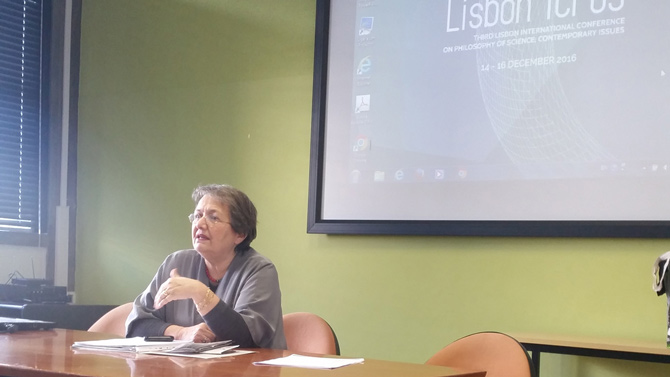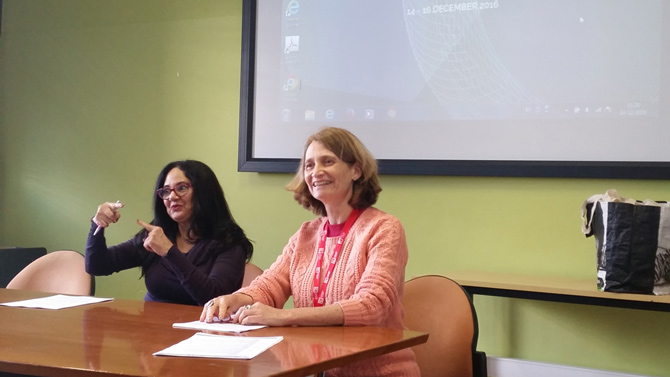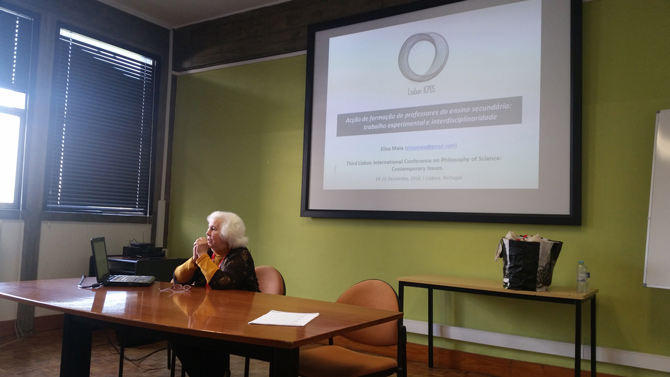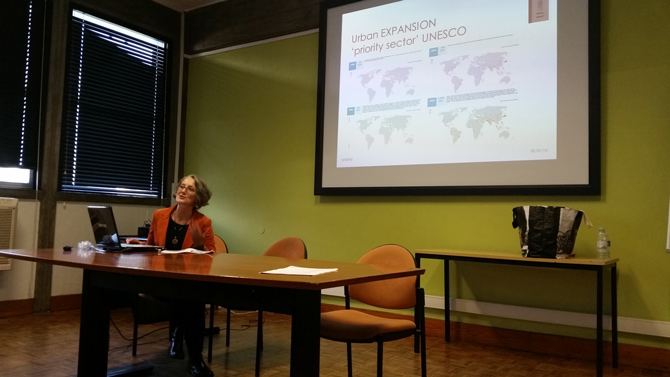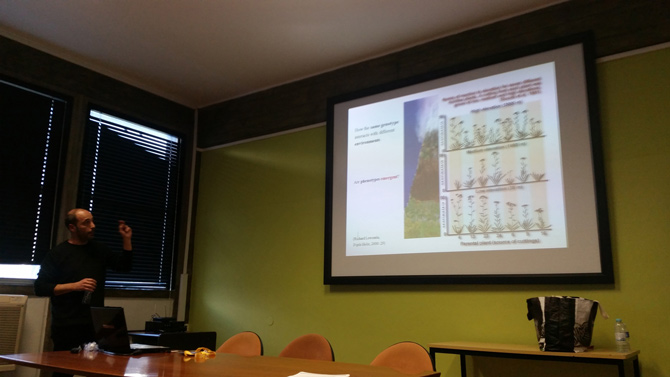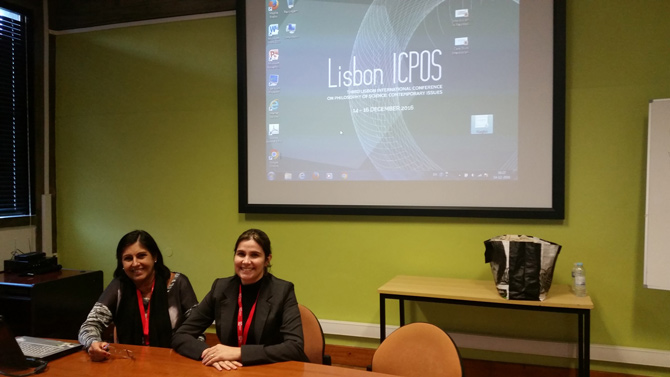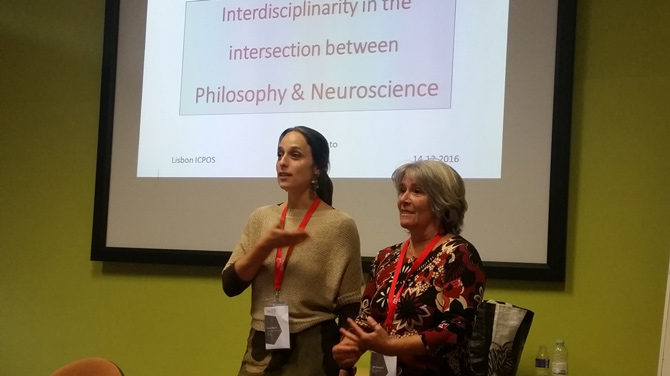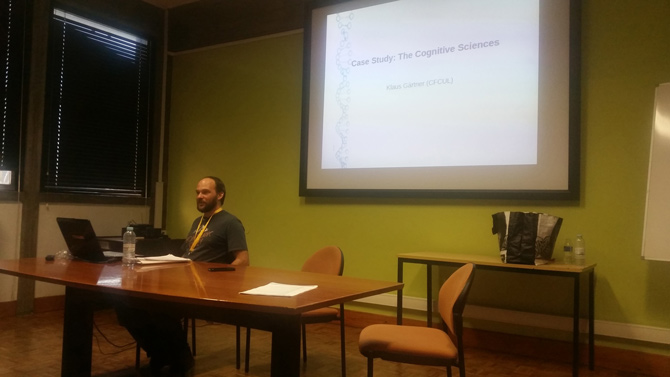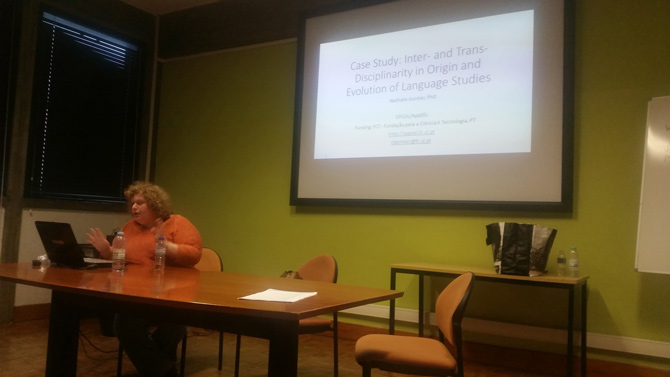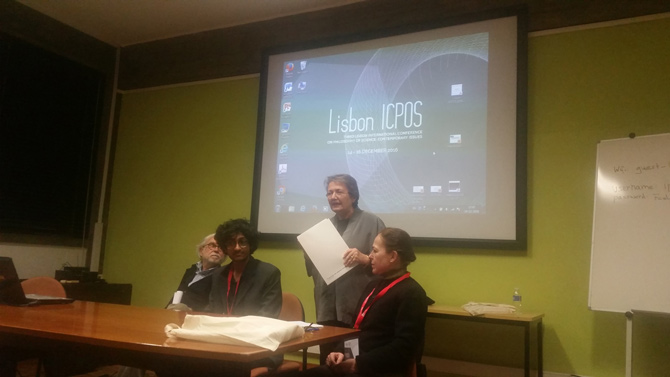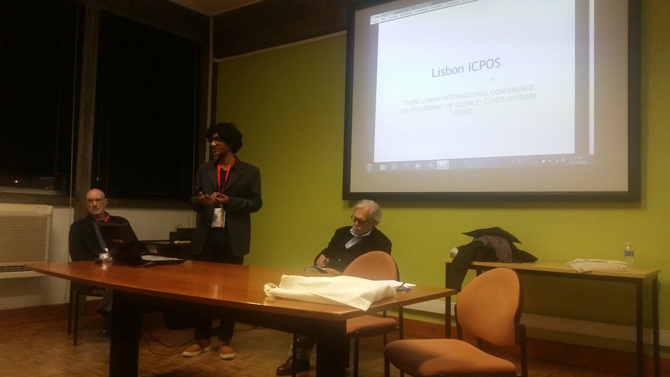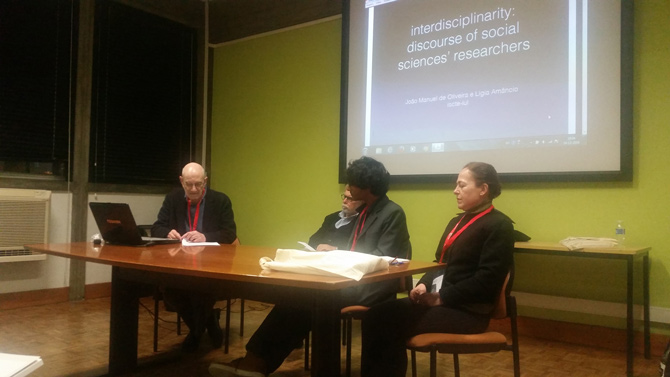Interdisciplinarity today: Scope and Application
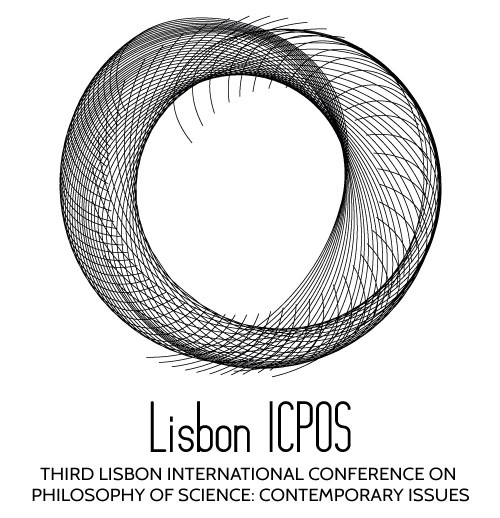
Interdisciplinarity today: Scope and Application
14 December, FCUL / Anfiteatro da Fundação
Coordinators: Prof. Olga Pombo, Klaus Gärtner.
Contact: klga@gmx.de
This symposium is put forward by the CFCUL thematic line “Unity of Science and Interdisciplinarity”. It continues a research being done with several colleagues, both from Portugal and in Brazil. The aim is to discuss several case studies in areas where ID plays an essential role. In this context, one panel (dedicated to ID approaches in education) and three round tables (discussing different interdisciplinary research areas) will be put forward.
The morning panel will discuss three ID case studies in the context of educational initiatives. Presentations will consider an experimental ID post graduation program, the relation between existing ID practices and formal/informal education, and an ID initiative for teachers of secondary schools. The former two case studies are about currently running programs in Brazil, while the third case study analyzes an already completed Portuguese initiative.
In the afternoon, the first round table is dedicated to case studies about urban studies, water research and the broad role played by emergence and relational ontology in several disciplines. The first case study will investigate the nexus between sustainability, ID and urban studies. This is followed by an assessment of ID in the context of Portuguese water research. The round table will close with a conceptual discussion of emergence and relational ontology within biology and the social sciences.
The second round table will deal with case studies discussing ID in the context of neurosciences, cognitive sciences and language studies. The first case study will discuss how the neurosciences and first-person methods go together. This is followed by the second case study which will have a close look at how ID approaches within the cognitive sciences have changed over time. The final case study will shed light on ID in the origin and evolution of language studies.
Finally, the third round table considers case studies about ID within transcontinental relations, social sciences and interdisciplinary applications in science. The first case study will consider how ID enters in transcontinental knowledge exchange in Lusophone countries. After, a discussion about ID discourses in the Social Sciences will be offered. The round table closes with an examination of the role of ID in the context of pressing questions or problems that go beyond the scope of one scientific discipline.
Program
Abstracts
Case Study: Programa de Pós-Graduação Interdisciplinar
Helena Esser dos Reis / Cerise de Castro Campos / Rosani Moreira Leitão (Universidade Federal de Goiás)
Neste estudo de caso é analisada a prática interdisciplinar em curso no Programa de Pós-Graduação Interdisciplinar em Direitos Humanos da Universidade Federal de Goiás. O Programa é baseado na integração interdisciplinar do trabalho de discentes, docentes e técnico-administrativos visando articular as actividades desenvolvidas no campo dos Direitos Humanos.
Case Study: Relações existentes entre práticas interdisciplinares e a formação formal e não formal
Giselle Faur de Castro Catarino (Universidade do Estado do Rio de Janeiro & Universidade do Grande Rio), Glória Regina Pessoa Campello Queiroz (Universidade do Estado do Rio de Janeiro)
O estudo de caso consistirá na análise de uma prática interdisciplinar peculiar resultante de uma formação inicial muito diferenciada que combina o formal e o não formal, a partir de uma parceria entre um Museu e instituições formadoras de professores.
Case Study: Acção de formação de professores do ensino secundário – trabalho experimental e Interdisciplinaridade
Elisa Maia (CFCUL)
Neste estudo de caso é analisada uma acção de formação realizada pelo Departamento do Ensino Secundário (DES) em 1999-2000, no âmbito da Reforma Curricular então em curso, relativa ao ensino experimental das ciências. Entre os objectivos da acção estabelecia-se “desenvolver competências científicas disciplinares e interdisciplinares e competências didácticas necessárias à implementação de trabalho prático numa perspectiva investigativa e interdisciplinar”.
A análise baseia-se na documentação produzida ao longo da acção. Através de entrevistas a alguns dos professores pretende-se ainda avaliar o impacte desta formação na sua prática lectiva subsequente.
Case Study: The sustainability, interdisciplinarity and urban studies nexus
Olivia Bina (Institute for Social Sciences of the University of Lisbon)
21st century challenges are characterized by high potential impact, complexity, and uncertainty. Understanding and addressing these types of challenges is an essential pre-requisite for meeting sustainability objectives and policies, and yet disciplinary boundaries and related institutions, cultures, and power structures continue to stand in the way of insight. Education and research are all too often called upon to create the conditions for sustainable futures, but are confronted with formidable internal barriers.
There is a pressing need for contextual and relational perspectives, and for the enabling of ”integrative” mindsets through the pursuit of interdisciplinary inquiries. The United Nations declaration of the Decade of Education for Sustainable Development advocates the need for universities to embed sustainability in all learning areas. We explore the specific link between Education for Sustainable Development and interdisciplinary practices, focusing on the specific case of post-graduate top-level programmes in urban studies. We start by reviewing an extensive literature to identify the principles and practices characterising the UN DESD, and to identify the topics and themes considered essential for teaching aimed at the promotion of sustainable urban development. Based on the extensive literature review we define an analytical framework in five parts, related to various aspects of curricular content and teaching and learning approaches: programme orientation, skills, ethics and critical reasoning, interdisciplinarity and content related to sustainable urban development issues. We then conduct an empirical study of 25 among the best post-graduate level (MA and MSc) programmes in urban studies from Europe, China, the USA and the Global South, to see how they are adapting their curricula to the requirements of sustainable urban development captured in the analytical framework. While acknowledging the significant context specificities that must be respected, and the multiple challenges that must be reconciled when defining urban studies curricula - we find both strengths and weaknesses in these top programmes, including important differences among the programmes from the four regions. Our data suggests that important steps are being taken towards ‘whole-system’ transformation envisaged by the UN Decade of Education for Sustainable Development, but also that trans- formative factors depending on cultural and institutional values and practices remain relatively weak.
Case Study: Assessing interdisciplinarity in water research in Portugal. Where to find the Social Sciences and Humanities?
Marta Varanda (Lisbon School of Economics & Management)
Our departing assumption is that water issues are complex and require an integrative, ID and holistic approach (Braimoth & Craswell 2008 p. 474). This is increasingly true as water problems, that had a more benign character in the 18th and 19th century, have taken a wicked character as the 20th century unfolded (Freeman 2000, p. 484).
In this study we set out to inquire whether Portuguese research centres approach water in an interdisplinary and holistic manner.
Water research was traditionally a “monopoly” of natural sciences: engineering, chemistry biology, ecology, climatic sciences …. But persistent difficulties in the management of water have made clear that “technical fixes”, which do not take into account the social, political, economic and cultural context, fail to address the root of the problems and endanger the sustainability of the resource. Hence the social sciences have been called into the water research field. At this point it is not yet clear what is the weight of their presence, what exactly is expected and demanded of them, in short, how are they contributing to water research aiming the sustainability of the resource. This research, still in its initial phase, aims to clarify some of those issues, which are at the centre of the debate of the collaboration between the social and natural sciences. Based on a web search (complemented by the authors and colleagues’ previous knowledge of the field) we identified all the research centres studying water in Portugal. The prevalence and nature of interdisciplinarity is identified through the integration of disciplines (codified according to OECD’s 2007 revised field of science and technology) of co-authors of randomly selected papers.
Preliminary findings show that research in water in Portugal is characterised mostly by collaboration within natural sciences (mainly earth and environmental sciences and biological sciences and engineering) with some interdisciplinary collaboration of the natural sciences with social sciences, represented almost exclusively by business and economics. This is consistent with a recent report on the role of Social Sciences and Humanities in the Horizon 2020, which shows the dominance of business and economics in interdisciplinary collaboration. The network pattern identified clearly reveals a core –periphery structure, with natural sciences at the core and the social sciences at the periphery, meaning that there is a hierarchical division of work within water research.
Many questions remain open: What is preventing social sciences from entering the study of water to side to natural sciences? What maybe the consequences of this lack of dialogue and open and frank cooperation? Are funding schemes, university structures, disciplinary “arrogance” or simply researchers lack of competences, time, knowledge blocking intersdisciplinary collaboration? These questions will shape this research next steps because “It is essential to seek comprehensive solutions which consider the interactions within natural systems themselves and with social systems. We are faced not with two separate crises, one environmental and the other social, but rather with one complex crisis, which is both social and environmental. Strategies for a solution demand an integrated approach to combating poverty, restoring dignity to the excluded, and at the same time protecting nature” (Pope Francis 2015, p.104).
Case Study: Emergence and Relational Ontology: Biology and Sociology
Gil C. Santos (CFCUL)
The ‘emergence’/’reductionism’ issue was born at the end of the 19th century. It was re-visited and was further developed at the end of the last century. The main subject of this issue lies in the relationships between the different levels of organization of reality and the relations between the different sciences such as physics, chemistry, biology, psychology, sociology etc. The basic problem concerns ontological and epistemological questions and applies to all sciences. From an ontological point of view the notion of ‘emergence’ can only be understood in the context of the opposition between ‘atomistic essentialism’ and a particular version of ‘relational ontology’. In this paper, I will analyze this opposition in biological and sociological ideas.
Case Study: Interdisciplinarity in neuroscience
Joana Rigato (Champalimaud/CFCUL), Rita Venturini (Champalimaud)
After almost a century in which most of the studies of the mind and brain strived to do away with subjectivity, for the past two decades many cognitive scientists regained interest in the introduction of first-person methods as a fundamental component of their empirical research. This was motivated by the realization that the personal experience a subject has at any given time is a precious source of information about her mind and cannot be accessed directly in any other way rather than by introspection.
There are many methods to access and communicate introspective experience. In this talk, Joana Rigato (philosopher of science) and Rita Venturini (neurologist, group facilitator and improviser) will present briefly their interdisciplinary experience at Champalimaud Research, where more than 200 neuroscientists do fundamental research on the brain.
Rita Venturini embraced the challenge of weaving together neuroscience and improvisation, which has been a source of recursive inspiration. Improvisation asks the neuroscientist to consider constructs that are not intrinsically emerging from the field, like the concept of presence and its relationship with awareness, actions and identity. Neuroscience provides improvisation with a grounded framework for its experiences, its theoretical claims and predictions.
Joana Rigato has dedicated herself to exploring the field of neurophenomenology, as well as mapping the various methods that have been proposed as ways to obtain accurate introspective reports from subjects. With a restricted group of neuroscientists, Joana and Rita implemented one of the methods, Descriptive Experience Sampling.
Case Study: The Cognitive Sciences
Klaus Gärtner (CFCUL)
Since the Cognitive Sciences are considered a paradigmatic example of interdisciplinarity, this case study analyzes what this means in practice. Consequently, interviews with actual scientists who work in the area on a daily basis were conducted and put in scientific context. The results of this case study stem from a reflection about what these respective scientists state, recent developments in the Cognitive Sciences and what this may imply for interdisciplinarity. The main conclusion is two folded. On the one hand, it confirms that the Cognitive Sciences are interdisciplinary in nature, on the other hand, it shows that this is highly context dependent.
Case Study: Inter- and Trans-Disciplinarity in Origin and Evolution of Language Studies
Nathalie Gontier (CFCUL)
By exemplifying how the new linguistic and sociocultural sciences make use of various evolutionary paradigms, we will detail the nature of the inter- and transdisciplinarity that currently characterizes origin and evolution of language research.
Case Study: Transcontinental Interdisciplinarity
José Carlos Tiago de Oliviera (CFCUL, University of Lisbon) / Viviana Yaccuzzi Polisena (Universidad Nacional de Tucumán, Argentina) / Bhargav Srinivasa Desikan (Institut National de Recherche Agronomique, Lille, France)
This case study is designed to analyze Interdisciplinarity in the context of transcontinental relations. In the XX century and in cooperation with Lusophone countries - from Angola to Asia and mainly Cape Verde - the project under scrutiny sought an exchange of knowledge between colleagues from Philosophy and Science and a contribution to the creation of new teaching methods, as well as libraries.
Case Study: Interdisciplinary discourses of social scientists
Jorge Jesuíno (CFCUL) / Lígia Amâncio (University Institute of Lisbon), João Manuel de Oliveira (University Institute of Lisbon)
Illustrative interviews with social scientists were conducted. The aim was to identify what the prevalent discursive repertoires about both the concept and practices of interdisciplinarity, grounded in their own experience, are. A first attempt to categorize the data leads to the following three types of discourse: (1) additive, (2) instrumental, and (3) strategic. This suggests an underlying polysemic nature of how the concept of interdisciplinarity is represented in the social sciences.
Case Study: Needs and Desires of Interdisciplinary Science
Helder Coelho (University of Lisbon)
Intractable issues motivate today scientists to break the borders of several disciplines, trying to work across bridges, by combination (binary or more), integration or juxtaposition, building a common ground. Meshing of different disciplines, for example technology and humanities, can yield good results, namely when we aim answers to pressing questions or problems that cannot be adequately addressed by people from just one discipline. Therefore, when we desire a collection of people tackling a big problem, using mote than their specific skills, we try a synthesis of different approaches into something unique. And, we adopt general principles, such as collective and cooperative effort, collaborative communication, discipline and no hierarchy.
Download Lisbon ICPOS Abstract Book







